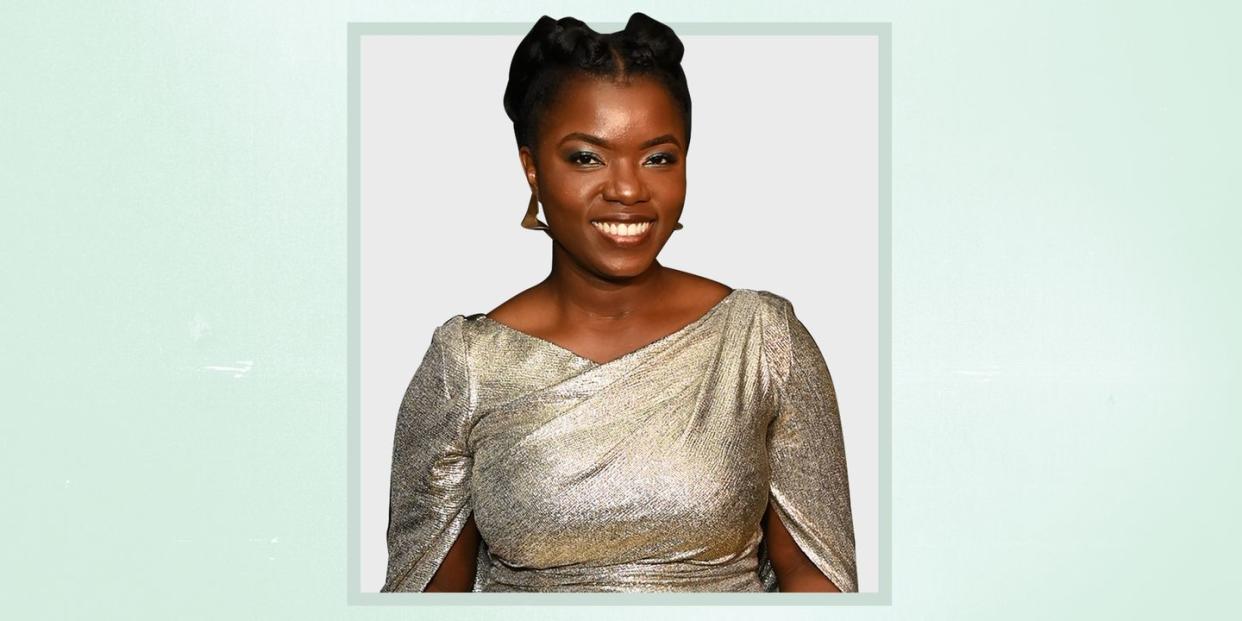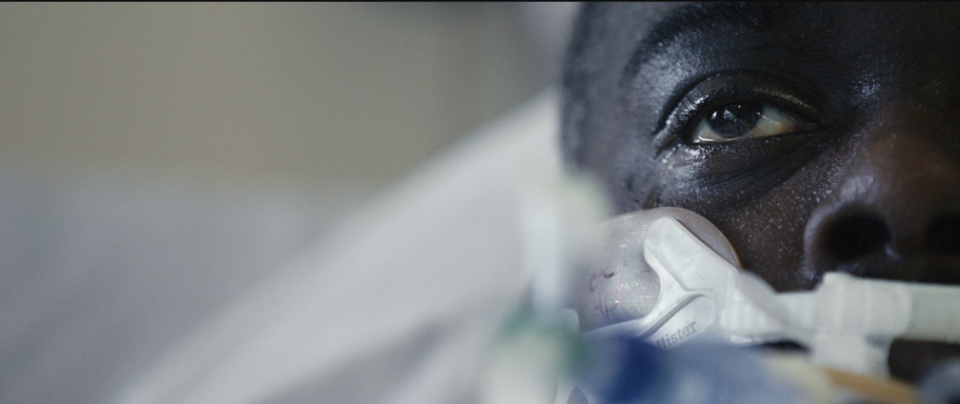Dr. Nathalie Dougé Wants 'The First Wave' To Wake You Up

- Oops!Something went wrong.Please try again later.
We understand if you don't want to, or even feel like you don't need to, watch any film, read any book, or stare at even a single painting that attempts to process the pandemic—especially as we're nearing two years since the March 2020 dawn of the virus in the U.S. with another new variant emerging. Honestly, even I avoided engaging with, for lack of a better term, pandemic art. That changed when I watched The First Wave while putting together the best documentaries of the year for Esquire.
For the film, director Matthew Heineman managed to get access to the Long Island Jewish Medical Center in Queens, NY, during the first four months of the COVID-19 response. He captured the patients fighting for every breath, medical personnel sobbing in the hallways of the hospital, families FaceTiming their sick husbands and wives from home—all of it. I was lucky enough to not have a loved one hospitalized during the early months of the virus, and putting names and faces, setbacks and small victories, to our collective trauma brought tears. It felt like a release. So when I talked to the main medical professional featured in the film, Dr. Nathalie Dougé, we talked about potential impact of a film like The First Wave—one that doesn't pull punches—and what comes from reliving some of the worst days of our lives.
"Out of sight, out of mind, keeps us stuck in this world of: Well, we're doing okay," Dr. Dougé told me over Zoom late last week. "But we could be doing better. We could be great if we truly processed some of the trauma we go through."
With The First Wave debuting on Hulu this past Sunday, following its theatrical release on November 19, Dr. Dougé also reflected on what the early days of the pandemic looked like for her, which we see play out in painful detail—hearing families cry from the other end of the phone, learning the effects of the virus in real time, and marching in New York following the murder of George Floyd.
ESQUIRE: The First Wave is so striking to watch because we're seeing actual patient care—something you would never normally be privy to. How important is it for people to be that level of inside the fight with you?
Dr. Nathalie Dougé: The First Wave really humanizes this pandemic. When you are able to truly see people, know their names, hear their voices—you can start empathizing truly with the situation. That allows us to truly take action, because you see yourself and you would never want to see unnecessary suffering happening to you. So I think this film is just incredible in showing the story in a 360 view—not just my side of things but for patients, to families, which is incredible.
Esquire: You're right. I don't know how you can watch the film and not imagine your loved ones in those beds.
N.D.: Exactly. That's what I want people to understand: It doesn't have to happen directly to you to get that visceral response. And I feel once you have that emotional attachment to something, it propels you to do something—and I think that's what The First Wave hopefully does to a lot of people.
Esquire: We see your patients fight so much in the documentary, what have you learned about human resilience in the past two years?
N.D.: A lot of us don't give ourselves enough credit for the strength we can harness when facing our mortality. I just feel that resilience we inherently have, because by nature we want to survive. By nature, no one just wants to die unnecessarily. So it really showed me these past two years that especially with the support of others, that inner strength that we harness inside it can really shine through… There's something when you see your mortality that you truly get to see people for who they are—without the biases, the stereotypes, without the projections that you may have onto them—and that's a beautiful thing to see.
Esquire: You watch how it can boil down to something as simple as seeing your partner on FaceTime. Your patients are hardly even able to register facial expressions and you still see the effect.
N.D.: In the beginning there was no one—the FaceTime didn't even come until later on, when we saw what isolation can do to someone. Even for the patients who may not have been as conscious or they might have been sedated, just hearing the voice of a loved one matters. And vice versa.
Esquire: On your side, how do you find the capability to maintain the level of empathy and compassion we see in the film?
N.D.: I feel that what I want done to me is what I should also give out. Because in a split second, I could be that person in the hospital bed. And I would hope that the level of empathy that I give out, I can eventually get back in return. So I do believe in that the more you give it's amazing how much you get tenfold. But I also realize that being empathetic takes a lot out of you. Especially with that volume that we had during the first wave, I felt at times to recover, to refill my cup, was getting harder and harder without having these moments of breaking down.
Esquire: About halfway through the documentary, we see you march in New York after the murder of George Floyd. You explain how the words “I can't breathe” also mean something in your world as a doctor—treating these people who literally were fighting for every breath. For those who haven't watched the documentary yet, could you talk about the extra meaning those words took during the pandemic?
N.D.: That phrase “I can't breathe” haunted me throughout the whole pandemic, even before the murder of George Floyd. That's the phrase I kept getting from my patients as they struggled to gasp for air. When we heard, “I can't breathe,” in the hospital, we're like, "OK, do they need more oxygen? What kind of medication can we give them?" That propelled us to do something to help them and yet I heard that these were some of the final words of Mr. George Floyd and nothing was done.
His life was just disregarded. That, to me, was soul-crushing. It was literally soul-crushing. That to me was the moment that I [thought], there's no way I could be such an advocate for the lives of my patients, and not an advocate for people who look like me—who are minorities, people of color, black, of poor economic status, whoever—and not have a voice outside of the hospital walls or clinic either.
Esquire: When you know the specifics of what people go through when they're struggling to breathe, it's something that forever sticks with you forever.
N.D.: You see that look of sheer anxiety, the fear. No matter how much they're trying to make themselves feel better, they're unsuccessful. And that type of suffering I wouldn't want to wish on anyone. So, it's truly disheartening that that's the type of world we can be in at this point, where you see people struggling and suffering and yet people become indifferent or they choose not to act and allow that suffering to continue.

Esquire: It's been almost two years since the events in the film, and we're still not even close to the end of this pandemic. What do you hope the actionable impact of this film will be?
N.D.: I hope that people see the urgency that's still there. In the beginning of the pandemic, what helped us get to the point where we have measures in place to lead to prevention, was the urgency. For us, it was a beautiful thing to see such an interdisciplinary way of action. When you take all the politics aside from it, collectively the world came together. That's how we got rid of the first wave.
So I really hope that this film shows people there aren't true saviors that you're going to be able to pinpoint. It's going to be individual actions that come together collectively for that common goal to end the pandemic, that will get us to end the pandemic. So we have now given options for people to help end this—and I'm not just talking about COVID, because there's also the racism pandemic that's been going on too. There are individual actions and indifference is something that is unacceptable either. So whether it's wearing a mask for social distancing, or the same way with speaking up for injustice. Because at the end of the day, that humanity that we all share, we all strive for that quality of life to truly enjoy the life we live. That's something we all collectively want.
Esquire: We really do seem to have lost the raw-nervousness of the first six to eight months. Even in New York you can sense it.
N.D.: I think we're guilty of it. And I actually think this movie is so much, in a way, a beginning therapy session, to get all those emotions out. But out of sight, out of mind, keeps us stuck in this world of: Well, we're doing okay. But we could be doing better. We could be great if we truly processed some of the trauma we go through. Because I think within chaos, uncertainty, and fear, it actually instills a sense of resourcefulness, adaptation, a sense of growth. But you can only go through those things when you process it. This film is not glorifying our trauma of the first few months that we went through. It's actually bringing to light that despite this trauma, with support, with resilience, with this collective urgency to do better. So that's what I really hope people get from this film. We're not trying to rehash people's PTSD. Because you have it no matter what, whether you watch the film or not, the PTSD is probably there. But we could process it together to be better.
You Might Also Like

